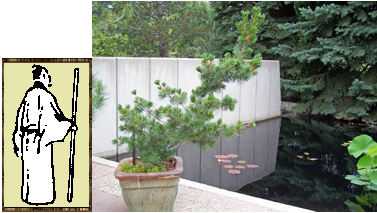
Hexagram Eighteen—Challenge
Hexagram Eighteen explains the work people need to do to restore a situation that has fallen into chaos and decay. One needs to consider the events that led to the situation and identify the events that must follow. The hexagram offers the metaphor of a son or daughter taking up the work of the deceased parents.
The first line, yin, shows a child carrying on the work of the parents. There is much opportunity.
The second line, yang, shows a child taking up the work of the family. It is better to do good work, rather than worry about what people say. Through good work, reputation will be restored.
The third line, yang, shows a child carrying on the work of the parents. It is better to make small errors, because that's the best way to learn. The effort alone is praiseworthy.
The fourth line, yin, shows a child dwelling on the parent's mistakes. Work done in this mood will bring only shame.
The fifth line, yin, shows a child willing and able to continue the family's work. Because the young apprentice learns to use the right tools, others will praise him/her.
The sixth line, yang, shows one who follows a career outside the family line. This person may work in the same mood of service and obtains the same results. This is the correct attitude of dedication and is worthy of praise.
Hexagram Eighteen Commentary
This hexagram offers a metaphor of a son or daughter taking up the unfinished work of the parents. The meaning is to work on a situation that has fallen into decay. The introduction says, "One needs to consider the events that led to the situation and identify the events that must follow." It is shown as an intergenerational regeneration because the previous situation was fully destroyed, like parents who died.
The first line, yin, shows a child carrying on the parents' work. It's honorable and the work is an opportunity.
The second line, yang, shows when a child takes on the family business, it's best if the child puts the focus on the quality of work. Worrying about the family reputation, or depending too much on the family reputation, is the wrong focus of attention. If a situation has fallen into chaos and decay, depending on the reputation from before the decay is hypocritical. Fixing the situation will take honest work, not trying to prop up what used to be.
The third line, yang, says the new effort may not be perfect, but it will be made perfect by learning from small mistakes. Even with mistakes included along the way, this line says, "The effort alone is praiseworthy." The calling to restore a situation, such as carrying on a family business, is what's important.
The fourth line, yin, explains the difference between examining the past and dwelling on the parents' mistakes. The introduction says to "consider" what led to the chaos and decay. Knowing the past can help steer the course to what needs to happen. However, it is better to dwell on the solutions instead of the mistakes.
The fifth line, yin, shows the best attitude. The heir to the work learns to use the correct tools. Things will come together and the subject of the fifth line will win admiration and praise.
In a situation that has fallen into chaos and decay, the opportunity to repair the situation may fall at the feet of the children. However, line six, yang, shows a person who chooses to say no to the opportunity. This person goes into another line of work with the same attitude of sincerity and purpose. The attitude is most important in this situation.
To the reader: Most of the hexagrams have at least one line that predicts bad results, but that does NOT mean you are fated to that result. The hexagrams illustrate different attitudes, so study the actions and reactions to learn the attitudes that will lead to better outcomes.
The I Ching teaches you to flow with changes and create positive change from the inside through conscious living. Your future is in your hands. Consult the I Ching for ideas that lead to clear thinking and positive mental attitude. Reading the I Ching helps you take the time to reflect on your attitudes and ideas. Continue asking until you feel positive about your course.

Click here for another hexagram.
A note about this interpretation of the I Ching: Nori Muster wrote this version of the I Ching in 1994 and put it online at Surrealist.org in 2000. It is also available at Amazon:
e-book
paperback
